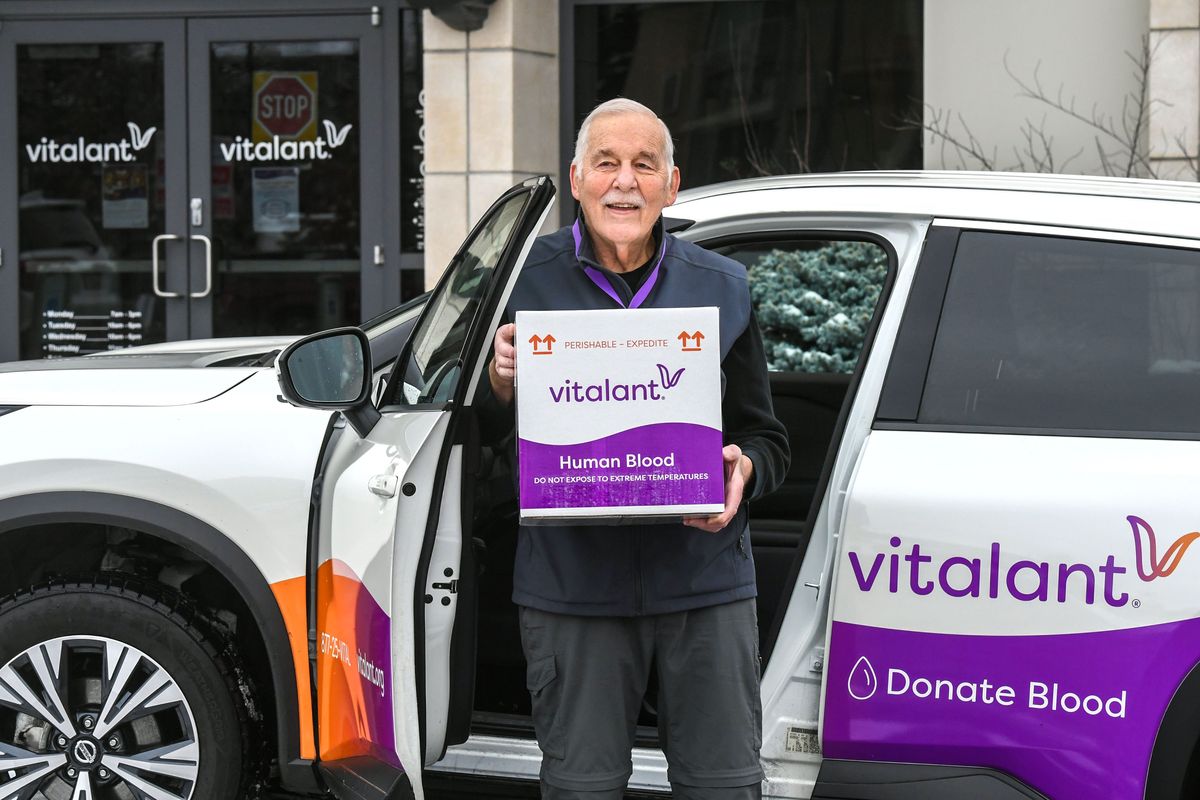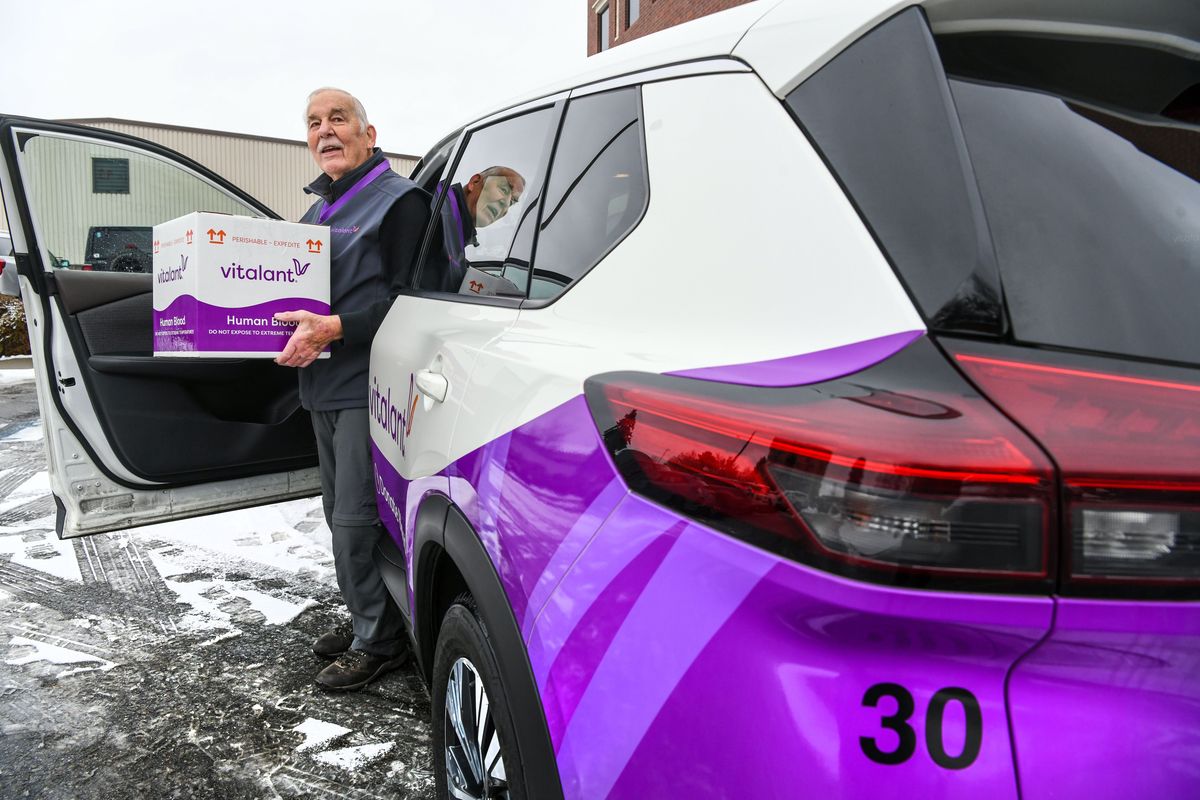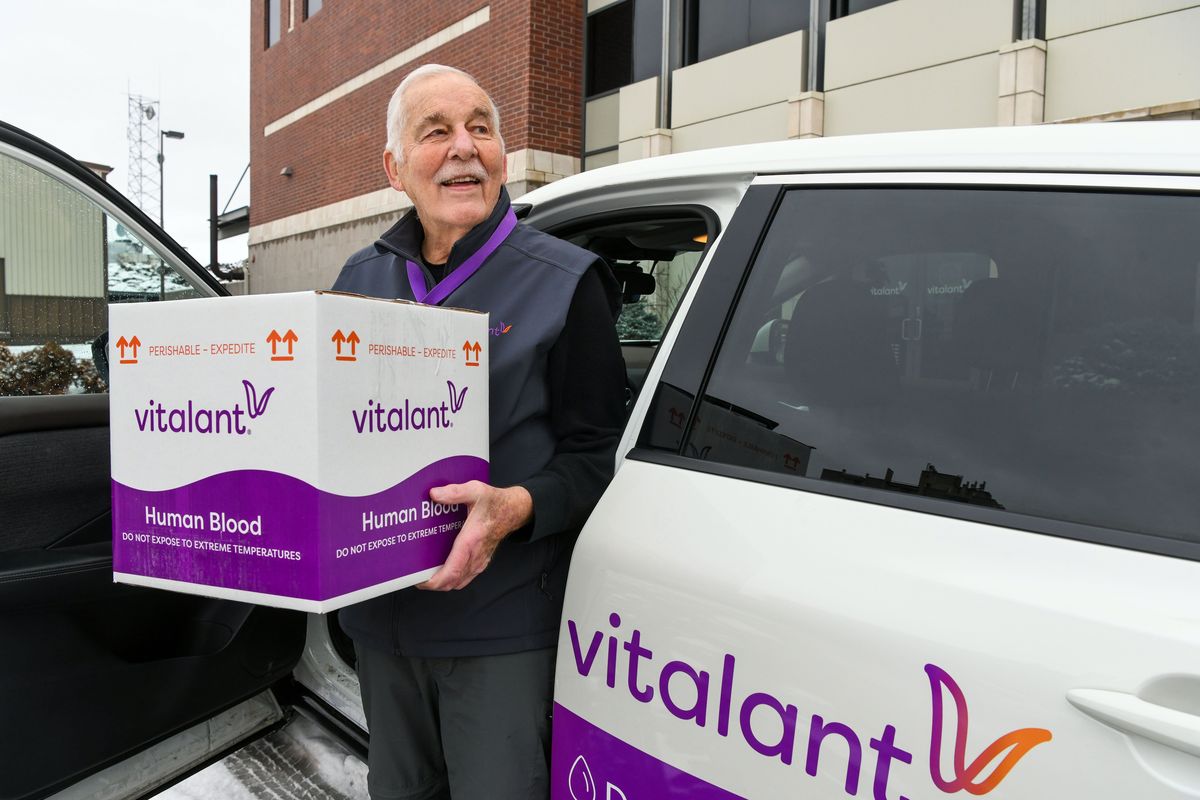Going the distance: Spokane volunteer courier Jim Mansfield, 84, covers quarter-million miles to deliver life-saving blood
After Jim Mansfield retired, he wanted to volunteer. The 84-year-old loves to drive and began volunteering two decades ago for Spokane blood center Vitalant as a blood courier. Today, Mansfield has clocked 255,000 miles for the nonprofit in delivering donated blood supplies to rural hospitals. (Dan Pelle/The Spokesman-Review)Buy a print of this photo
Longtime Spokane blood center volunteer Jim Mansfield has far surpassed going the distance – covering more than a quarter-million miles to be exact.
In June, the Vitalant blood courier hit the milestone of 255,000 miles driven for the nonprofit in 22 years of service delivering donated supplies from Spokane to rural hospitals. Routes have traversed Sherman Pass, led to Grand Coulee Dam and crossed Lake Roosevelt on a ferry.
Mansfield, 84, said he plans to continue his role – scaling back a bit – because the blood supplies are crucial to saving lives. As a bonus, he loves to see the outdoors on all those volunteer drives, even during winter conditions.
“I’m already at 256,000 miles, so I spend a lot of time behind the wheel,” Mansfield said. He enjoys driving. “My wife thinks I’m crazy. In September, my wife and I took a 4,000-mile drive back to visit family in Missouri.”
He calls blood donors the real heroes. Vitalant in Spokane serves 35 hospitals in the Inland Northwest. Mansfield and about a dozen other couriers use vehicles from the nonprofit’s fleet for deliveries.
Although Mansfield lightened his schedule, he still makes trips for the nonprofit at least twice a week.
“When I hit that quarter-million-mile mark, I backed off from three of my long-distance trips,” Mansfield said. “Now, the farthest I go is Moses Lake, Grand Coulee and St. Maries.
“Before, I was probably going three times a week or 12 times a month. Now, I’m maybe going 11,000 miles a month and about six to eight trips a month.”
Mansfield and his wife Charlotte returned to Spokane in 1999 after his 38-year career in higher education, with a bulk of that at Gonzaga University where he was dean of admissions from 1969 to 1987. He retired from the University of Wyoming as director of admission and enrollment management.
In December 1999, while getting some home wiring done, an electrician asked what Mansfield planned to do in retirement.
That electrician was then a blood center courier and offered to take Mansfield on a run to hospitals. “The rest was history,” Mansfield said.
His Vitalant work continued steadily, around some winter snowbirding the couple did for 19 years with an RV in Palm Desert, Calif. Now, they stay in Spokane because they enjoy being here and their volunteer roles, he said.
Mansfield in years past went backpacking and camped with family. He did prior volunteering at a state park doing maintenance and repairs. He enjoys scenic drives. “I was formerly a hunter and fisherman. I don’t do that anymore, but yeah, I have a great love of the outdoors.”
When Mansfield arrives at the blood center, he picks up units of blood that are on ice and boxed. It might be more than one box. Deliveries sometimes include platelets for cancer treatment, or plasma. From the hospitals, he might bring back “short-dated blood” to Spokane.
“Rural areas, they have to have it on hand, and sometimes they don’t use it all,” he said. “You have to bring it back so it can be used here.”
Once at a hospital, he uses a handcart to transport the box to hospital lab staff. He knows most of the employees in the labs. He’ll then wait in the lobby until someone brings the cart back to him with any returned blood supplies.
“Blood has a shelf life of four weeks or more, whereas platelets are only five days. Sometimes, we run platelets out, and if they don’t use them, they have to be returned almost the next day or two days later so they can be used here in town at the bigger hospitals.”
He might also go to a town and bring back supplies from a community blood drive, such as recently from Deer Park.
Mansfield has known a few times on his journeys that a specific patient urgently needed some of the blood supplies he was transporting. Generally, though, he knows that the thousands of units of blood do save lives.
While some emergency patients don’t make it, Mansfield is aware of stories of survival, whether he or another courier delivered the blood supply.
“My wife had emergency brain surgery and needed a transfusion then and also another time when she had an aortic valve replaced,” he said. The son of a blood center leader four years ago needed to receive a large amount of red blood cells, Mansfield added.
“Four years later, she watched her son walk across the graduation stage at the University of Washington, and she said to me, ‘I know you probably handled the blood that saved my son.’ I have no way of knowing that, but, yes, that was possible.”
Mansfield also previously served as blood drive chairman at St. Peter Catholic Church in Spokane. He can’t donate blood himself because of taking blood thinner medication, but he wanted to help. “During that time, we had enough blood donated to save 4,000 lives,” he said.
“What I find most amazing about working with blood is that there is no discrimination. It doesn’t care who you are, what your age is, what your color is or ethnicity is, or religion. Everybody uses blood. To me, that is so satisfying to help so many people. Everybody who needs it, actually.”
Entering 23 years as a courier, he’s remained accident-free except for what’s called an “incident” when a deer jumped in front of his vehicle. Mansfield had other traffic next to him with nowhere to go, and so the deer was hit.
Severe weather isn’t a deterrent. “No, I’ve driven in everything. I’ve gone over Sherman Pass, the highest pass in Washington between Kettle Falls and Republic. I go through there twice a month during the winter.
“Yeah, I’ve driven in the worst of it all. We lived in Alaska, too, for seven years, and I drove the Alaska Highway 15 times, so I’m used to the elements.”
Mansfield usually knows a month to six weeks ahead what his schedule will be for Vitalant. He often takes an all-wheel-drive Nissan Rogue that handles well in snow and ice.
He’s taken his wife on trips a couple of times, but she does her own volunteering. They’ve been married nearly 62 years and raised four children. They have seven grandchildren.
Mansfield said he’ll drive for Vitalant as long as he can.
“I guess until they take my keys away,” he said. “I have a couple of goals in mind, one might be to hit say 300,000, but we’ll see how that works. Right now, the good Lord has given me the ability to do what I can do. It’s in his hands.”
There’s always a need for other couriers, and for volunteers who do hospitality, he said.
“Volunteer work is just so satisfying. I just think it’s so rewarding to me personally, and the fact that I know how many people it helps when they receive blood. You just never know when you’re going to need it.”


